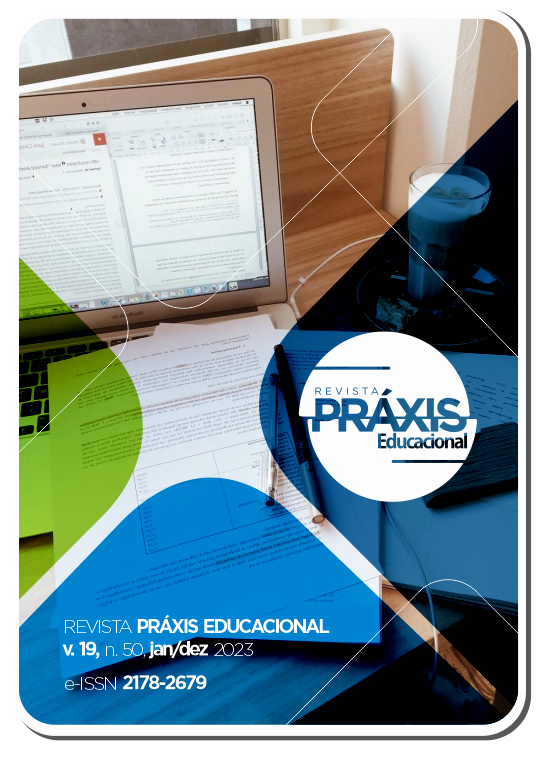Ebós of knowledge: crossing pedagogy and opening paths to decoloniality
DOI:
https://doi.org/10.22481/praxisedu.v19i50.12963Keywords:
auto(oris)ethnography, colonial loads, decoloniality, ebos of knowledge, pedagogy of terreiroAbstract
In this article we reflect on the aspects of a sensitive pedagogy when crossing crossroads and opening paths to knowledge and values connected to traditions of African matrices, thought here as the pedagogies of the terreiro and the implications of these with the training of teachers at the university, glimpsing perspectives of worldviews historically denied, made invisible and silenced in the process of teacher education and in teaching. The research incorporated a qualitative methodology through an auto(orís)ethnography, which evoked orís and bodies that are constituted in the terreiro and build knowledge arising from our ancestry in teachings and learnings founded on the collectivity, on what is experienced, lived and felt. We understand that occupying the university is the way to build pluri-epistemic pedagogical practices that disrupt coloniality in teacher training, enhancing our knowledge that emerges from our terrestrial belonging, seen and understood as subaltern and continually denied in social and educational spaces.
Downloads
Metrics
References
ARIAS, Patricio Guerrero. Hilando sueños, luchas, esperanza y ternura para tejer la vida por una red de sabidurías y ciências sociales de abya-yala. In: Corazonar. Una antropología comprometida con la vida - Miradas otras desde Abya-Yala para la decolonización del poder, del saber y del ser. Ecuador: Ediciones Abya-Yala Quito, 2010.
BRANDÃO, Carlos Rodrigues. O que é educação. São Paulo: Brasiliense, 2013. (Coleção Primeiros Passos).
CANDAU, Vera. Maria. A diferença está no chão da escola. In: COLÓQUIO LUSO-BRASILEIRO SOBRE QUESTÕES CURRICULARES, 4; COLÓQUIO SOBRE QUESTÕES CURRICULARES, 8., 2008, Florianópolis. Anais [...] Florianópolis: Universidade Federal de Santa Catarina, 2008.
FREIRE, Paulo. Pedagogia da esperança – um reencontro com a pedagogia do oprimido. Rio de Janeiro/São Paulo: Paz & Terra, 2020.
GROSFOGUEL, Ramón. El giro decolonial: reflexiones para una diversidad epistémica más allá del capitalismo global. Bogotá: Siglo del Hombre Editores, 2007.
KRENAK, Ailton. Ideias para adiar o fim do mundo. São Paulo: Companhia das Letras, 2019.
LARROSA, Jorge. Notas sobre a experiência e o saber da experiência. Revista Brasileira de Educação, n.19, p. 20-28. 2002. Disponível em: https://www.scielo.br/j/rbedu/a/Ycc5QDzZKcYVspCNspZVDxC/?format=pdf&lang=pt. Acesso em: 18 fev. 2022.
OLIVEIRA, Eduardo. Epistemologia da Ancestralidade – Preâmbulo. 2009. Disponível em: https://filosofia-africana.weebly.com/uploads/1/3/2/1/13213792/eduardo_oliveira_-_epistemologia_da_ancestralidade.pdf Acesso em: 12 jul. 2020.
RIBEIRO, Djamila. Quem tem medo do feminismo negro? São Paulo: Companhia das Letras, 2018.
SIMAS, Luiz Antônio; RUFINO, Luiz. Flecha no tempo. Rio de Janeiro: MV Editora, 2018.
SIMAS, Luiz Antônio; RUFINO, Luiz. Fogo no mato: A Ciência encantada das macumbas. Rio de Janeiro: Mórula Editorial, 2019.
WALSH, Catherine. Interculturalidad, estado, sociedade: luchas (de)coloniales de nuestra época. Quito: Universidad Andina Simón Bolívar y Ediciones Abya Yala, 2008.
WALSH, Catherine. Interculturalidade Crítica e Pedagogia Decolonial: in-surgir, re-existir e re-viver. In: CANDAU, Vera Maria. Educação Intercultural na América Latina: entre concepções, tensões e propostas. Rio de Janeiro: 7Letras, 2009.
WALSH, Catherine. Lo pedagógico y lo decolonial: Entretejiendo caminhos. In: WALSH, Catherine (ed.) Pedagogías decoloniales: Prácticas insurgentes de resistir, (re)existir y (re)vivir. Quito: Ediciones Abya-Yala, 2013.
Downloads
Published
How to Cite
Issue
Section
License
Copyright (c) 2023 Práxis Educacional

This work is licensed under a Creative Commons Attribution-ShareAlike 4.0 International License.
You are free to:
Share - copy and redistribute the material in any medium or format; Adapt - remix, transform, and build from the material for any purpose, even commercially. This license is acceptable for Free Cultural Works. The licensor cannot revoke these freedoms as long as you follow the terms of the license.
Under the following terms:
Attribution - You must appropriately give credit, provide a link to the license, and indicate if any changes have been made. You may do so in any reasonable way, but not in a way that suggests that you or your use is endorsed by the licensor.
There are no additional restrictions - You cannot apply legal terms or technological measures that legally restrict others to make any use permitted by the license.










